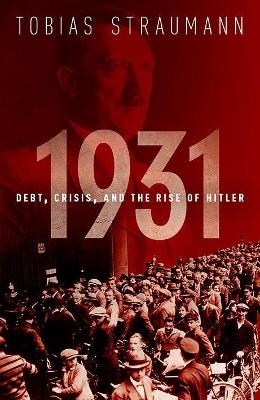
1931
Oxford University Press (Verlag)
978-0-19-881618-8 (ISBN)
- Titel ist leider vergriffen;
keine Neuauflage - Artikel merken
The reason for the financial collapse was Germany's large pile of foreign debt denominated in gold currency which condemned the government to cut spending, raise taxes, and lower wages in the middle of a worldwide recession. As the political resistance to this austerity policy grew, the German government began to question its debt obligations, prompting foreign investors to panic and sell their German assets. The resulting currency crisis led to the failure of the already weakened banking
system and a partial sovereign default.
Hitler managed to profit from the crisis, because he had been the most vocal critic of the reparation regime. As the financial system collapsed, his relentless attacks against foreign creditors and the alleged complicity of the German government resonated more than ever with the electorate. Sadly enough, Germany's creditors hesitated too long to take the wind out of Hitler's sails by offering debt relief.
In 1931,Tobias Straumann reveals the story of the fatal crisis, demonstrating how a debt trap contributed to the rapid financial and political collapse of a European country, and to the rise of the Nazi Party.
Tobias Straumann is an Associate Professor of Economic History at the University of Zurich. He is a member of the European Historical Economics Society and the academic council of the European Association for Banking and Financial History. Straumann has widely published in the area of twentieth-century European financial and monetary history, and is the author of Fixed Ideas of Money: Small States and Exchange Rate Regimes in Twentieth-Century Europe (Cambridge University Press, 2010), and co-author of The Value of Risk: Swiss Re and the History of Reinsurance (Oxford University Press, 2013).
Preface
Introduction
Confidence
1: Laughing at the Raven
2: A Triumph of Diplomacy
3: 'Strong Cards to Play'
Indecision
4: Hitler's Victory
5: To the Brink and Back
6: 'The First Real Chancellor Since Bismarck'
Despair
7: Squaring the Circle
8: Help from Washington
9: Endgame
10: The Rise of Hitler
Epilogue
Sources
References
Notes
Index
| Erscheinungsdatum | 08.02.2019 |
|---|---|
| Zusatzinfo | 16 black and white images |
| Verlagsort | Oxford |
| Sprache | englisch |
| Maße | 148 x 224 mm |
| Gewicht | 386 g |
| Themenwelt | Geschichte ► Allgemeine Geschichte ► Neuzeit (bis 1918) |
| Geisteswissenschaften ► Geschichte ► Regional- / Ländergeschichte | |
| Geschichte ► Teilgebiete der Geschichte ► Wirtschaftsgeschichte | |
| Sozialwissenschaften ► Politik / Verwaltung ► Politische Systeme | |
| Sozialwissenschaften ► Politik / Verwaltung ► Politische Theorie | |
| Wirtschaft ► Betriebswirtschaft / Management | |
| Wirtschaft ► Volkswirtschaftslehre ► Finanzwissenschaft | |
| ISBN-10 | 0-19-881618-9 / 0198816189 |
| ISBN-13 | 978-0-19-881618-8 / 9780198816188 |
| Zustand | Neuware |
| Haben Sie eine Frage zum Produkt? |
aus dem Bereich


